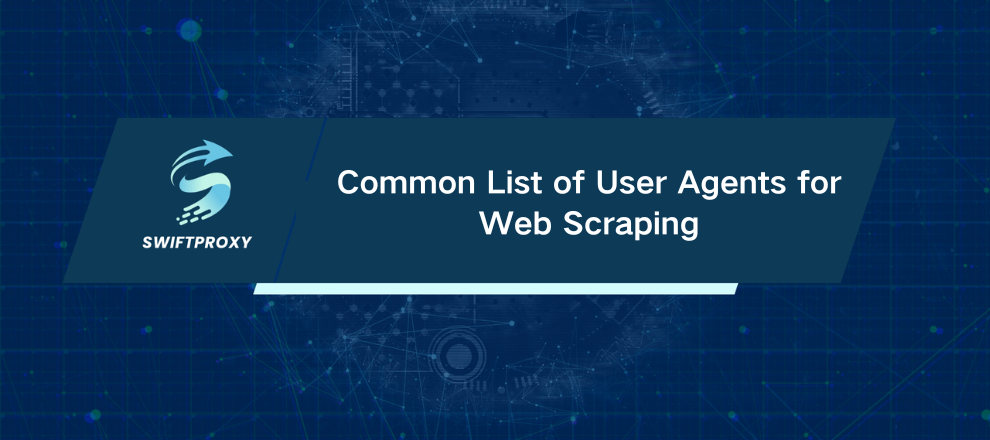Common List of User Agents for Web Scraping
User agents might seem like tiny strings of text—but underestimate them at your peril. They are crucial for any web scraping pipeline. The right user agent can mean fewer CAPTCHAs, smoother data collection, and a lot less frustration. In this article, we’re breaking down the most common user agents, how they work, and how to use them like a pro.

What Is a User Agent Really
A user agent (UA) is your browser—or any client application—introducing itself to a web server. It's more than just a name. The string reveals browser type, operating system, software versions, and even device type. Servers use this info to send content optimized for your device. Think of it as the server asking, "Who's there?" and your UA politely replying, "It's me, running Chrome on Windows 10."
Why Websites Care About User Agents
Content Delivery Enhancement
Websites can serve different layouts depending on your UA. Mobile users get touch-friendly designs. Desktop users see a richer interface. Some features only work on certain browsers, so the UA decides what gets loaded.
Analytics and Logging
User agents provide insights into which devices and browsers visitors use. This info drives better content decisions, improves UX, and helps track trends over time.
Access Control and Security
Servers can block known malicious bots by checking UAs. Combined with IP addresses, they enforce rate limits. If you hammer a site too aggressively, the UA may get you temporarily blocked.
Feature Support
Servers identify your browser to enable or disable features. Old browsers might skip advanced HTML5 elements. Modern browsers get enhanced scripts. It's all about serving the right experience.
Why User Agents Matter for Web Scraping
When scraping, your UA is your disguise. Here's why:
Content Negotiation: Mobile vs. desktop versions of a page can differ dramatically. Choosing the right UA ensures you get the content you want.
Avoiding Detection: Generic or outdated UAs scream "bot." Switching to realistic ones lowers your risk of being flagged.
Respecting Site Rules: Many sites forbid scraping explicitly but allow regular browser access. Using a legit UA keeps you in the clear.
Testing and Validation: Simulate different devices to see how content or features change. This is critical for debugging cross-browser issues.
How to Identify User Agents
Every HTTP request carries a User-Agent header. Servers read it to decide how to respond. Here's the process in simple steps:
Client sends a request with headers, including UA.
Server extracts and parses the UA string.
Server responds—maybe mobile content, maybe desktop content, maybe a block if it's suspicious.
You can even simulate this in Python using Flask:
from flask import Flask, request, jsonify
app = Flask(__name__)
blocked_user_agents = ['BadBot/1.0']
@app.route('/')
def check_user_agent():
ua = request.headers.get('User-Agent', '')
if ua in blocked_user_agents:
return jsonify({"message": "Access Denied"}), 403
return jsonify({"message": "Content served"}), 200
if __name__ == '__main__':
app.run(debug=True)
How to Switch User Agents
Changing your UA is simple but powerful. In Python with requests:
import requests
url = 'https://example.com'
headers = {
'User-Agent': 'Mozilla/5.0 (Windows NT 10.0; Win64; x64) AppleWebKit/537.36 Chrome/91.0.4472.124 Safari/537.36'
}
response = requests.get(url, headers=headers)
print(response.content)
Switching UAs makes your scraper appear like a different device or browser—critical for avoiding detection.
List of User Agents for Web Scraping
Here are reliable choices for popular browsers:
Chrome Desktop (Windows 10):
Mozilla/5.0 (Windows NT 10.0; Win64; x64) AppleWebKit/537.36 Chrome/91.0.4472.124 Safari/537.36
Chrome Mobile (Android):
Mozilla/5.0 (Linux; Android 10; SM-G975F) AppleWebKit/537.36 Chrome/91.0.4472.124 Mobile Safari/537.36
Firefox Desktop:
Mozilla/5.0 (Windows NT 10.0; Win64; x64; rv:89.0) Gecko/20100101 Firefox/89.0
Safari iOS:
Mozilla/5.0 (iPhone; CPU iPhone OS 14_6 like Mac OS X) AppleWebKit/605.1.15 Version/14.1.1 Mobile/15E148 Safari/604.1
How to Avoid UA Bans
1. Rotate User Agents
Switching UAs randomly mimics traffic from multiple devices. This reduces detection, spreads rate limits, and avoids pattern recognition.
from random import choice
user_agents = ['UA1', 'UA2', 'UA3']
ua = choice(user_agents)
2. Add Random Intervals
Humans don't click at perfectly timed intervals. Mimic this behavior to bypass detection.
import time, random
time.sleep(random.uniform(1,5)) # Wait 1–5 seconds
3. Keep UAs Up-to-Date
Outdated UAs can be flagged instantly. Use modern browser strings to blend in with legitimate traffic.
4. Custom User Agents
Craft UAs tailored to your needs. Add complexity or metadata to confuse basic detection filters.
Final Thoughts
A User-Agent may look simple, but it shapes how smoothly your scraper operates. Rotating realistic UAs, adding random delays, and keeping them updated helps you stay under the radar. With smart rate limiting and retries, your scraper blends in like normal traffic, delivering stable data with minimal hassle.

















































